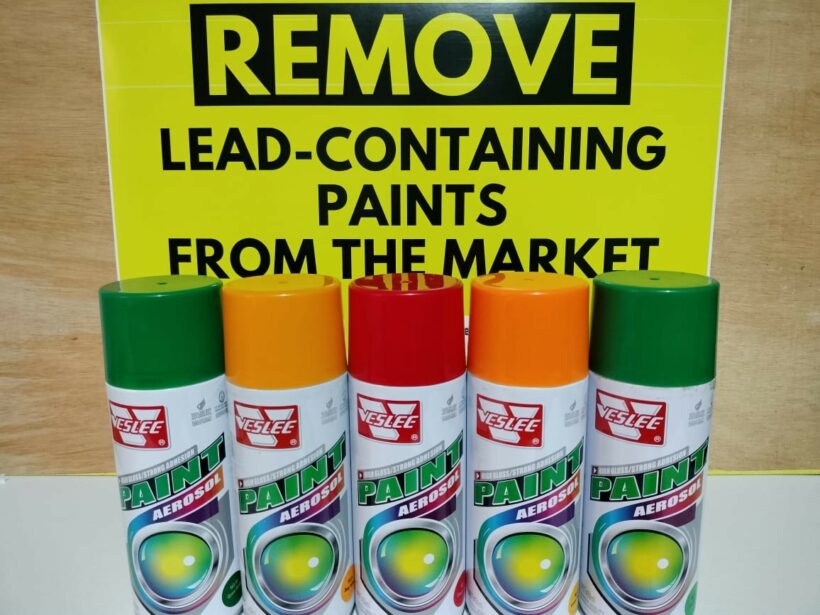8 February 2024, Quezon City. The toxics watchdog group EcoWaste Coalition today announced its discovery of five more imported spray paints containing high concentrations of lead that are illegally sold online.
As part of its continuing advocacy to promote strict adherence to the national lead paint ban to protect human health from the adverse effects of lead exposure, the group recently obtained five variants of Veslee Paint Aerosol from an online seller for P130 per 450 ml can.
“The continued importation, distribution, and sale of lead-containing paint products is an outright infraction of a government-issued Chemical Control Order (CCO) banning the use of lead additives in the production of paints and similar surface coatings,” said Manny Calonzo, Campaigner, EcoWaste Coalition. “It is evident that supplemental initiatives are necessary to enforce the regulation and rid the market, including e-commerce sites, of such products.”
“There is no compelling reason for paint manufacturers to continue using lead-based raw materials as safer alternatives to lead have become widely available in recent years. This includes alternative pigments for lead chromates—the most common lead-based ingredient used in paint manufacturing. For all our sakes, it always makes good public policy to eliminate all sources of lead exposure—and we can start with banning lead in all paints, including spray paints,” said Jeiel Guarino, International Lead Paint Campaigner, International Pollutants Elimination Network (IPEN).
The said spray paint products were manufactured in China by Guangzhou Veslee Chemical Science and Technology Co. Ltd. Two of the products (grass green and lemon yellow) were produced in March and September 2023, way past the country’s phase-out deadline for lead-containing paints. The three other products provided no information when they were made.
As stipulated in DENR A.O. 2013-24 (also known as the CCO for Lead and Lead Compounds), lead-containing decorative paints, including general-purpose spray paints sold for consumer use, were phased out from 2013-2016, while lead-containing industrial paints were phased out from 2013-2019.
To determine if the products conform to the lead in paint standard of not more than 90 parts per million (ppm), the group individually sprayed the paint on laths and subsequently screened them for lead using a portable X-ray fluorescence (XRF) analyzer.
As per XRF screening, the lemon yellow Veslee spray paint had over 100,000 ppm lead, while the deep yellow, grass green, leaf green and orange-red variants had 45,440 ppm, 31,060 ppm, 30,560 ppm, and 12,150 ppm, respectively.
Despite the country’s ban on leaded paints, the EcoWaste Coalition continues to find non-compliant paints, imported paints in particular, with lead content surpassing the 90 ppm limit. None of these leaded paints was manufactured or distributed by companies belonging to the Philippine Paint and Coatings Association (PPCA).
Last month, for instance, the group bared a total of 34 spray paints with undisclosed lead additives, including 26 products with lead content above 10,000 ppm of which three contained lead in excess of 100,000 ppm.
According to a fact sheet published by the United Nations Environment Programme (UNEP) for the Global Alliance to Eliminate Lead Paint (GAELP), “lead is a multi-system toxicant for which no safe level of exposure has been identified. One major source of exposure, particularly for children, is through lead paint, or paint to which lead compounds have been added as pigments, drying agents or anti-corrosives.”
“Lead exposure can cause chronic and debilitating health impacts in all age groups, but it is particularly harmful to young children. This is because their developing nervous systems can be damaged by lead, resulting in reduced cognitive abilities, poor educational attainment, attention deficit disorder, and antisocial behavior. In adults, lead exposure can cause hypertension, renal impairment, and damage to the reproductive organs,” the fact sheet said.
To protect children and other vulnerable populations against lead exposure via lead-containing paint, dust, and soil, the EcoWaste Coalition is working with government and industry stakeholders to promote the effective enforcement of the country’s lead paint ban. The group is also participating in a global campaign that seeks to list lead chromates in the Rotterdam Convention to control the international trade of these common lead-based pigments used in the manufacture of paints.
The group is also urging consumers to assert their rights to product information and product safety in line with the Consumer Act of the Philippines and to only buy and use adequately labeled paints with no added lead such as certified products bearing the Lead Safe Paint® logo.
https://chemical.emb.gov.ph/wp-content/uploads/2017/03/DAO-2013-24-CCO-Lead.pdf






